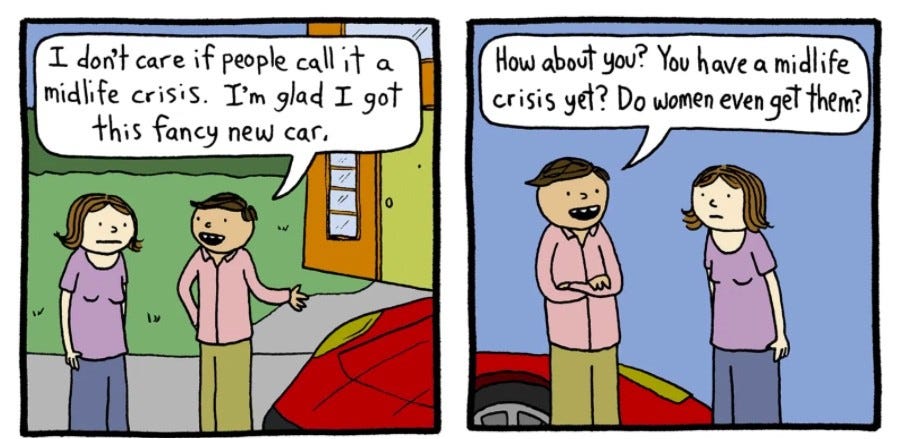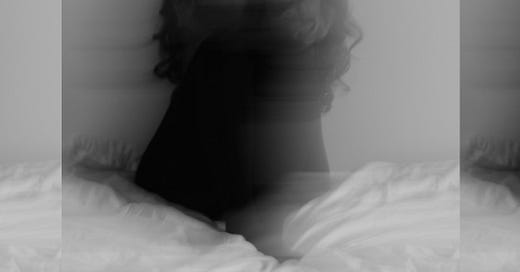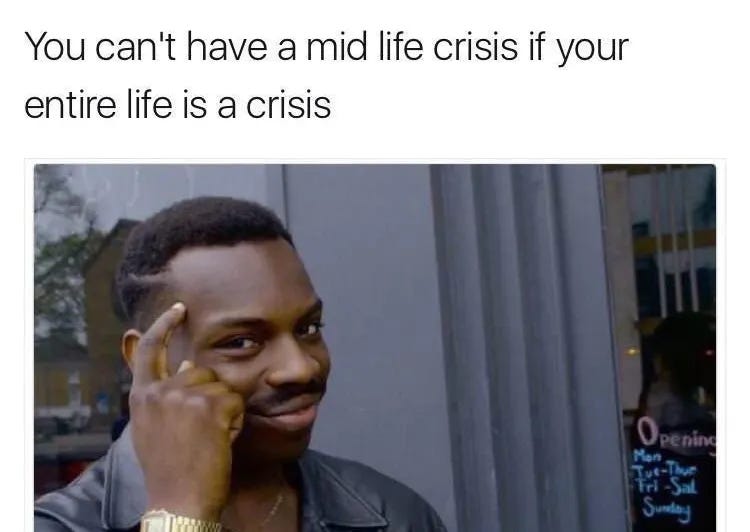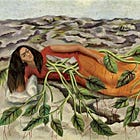I’m Tuğba, a Turkish-Greek artist living in Berlin - as slow as possible is a newsletter exploring the in-between spaces of our lives that we see but often do not notice. Interested in reading more of my work?
Ai ai, brace yourself for a deeply personal post that I’m absolutely itching to write.
I hit the big 4-0 in May, and it was a rollercoaster of emotions, but I think I've made peace with it now… Okay, maybe a tiny part of me longs for my thirties.
Looking back, my confusion started last year at 39 when I made the bold decision to freeze my eggs despite never really wanting kids. I now realise that it was a move driven by panic.
I remember one of my old friends said at the time, “I think you have Torschlusspanik.”
Tor: Gate
Schluss: Close (from the verb schließen – to close)
Panik: Panic
The literal translation of Torschlusspanik is “gate closing panic”!
Although there is no English equivalent for this feeling, it is somewhat akin to a midlife crisis. I only discovered the origin of this term after a quick Google search last year. It turns out that the word dates back to medieval times and refers to the panic experienced by city residents just before nightfall as they hurried back before the city gates closed. Being locked out for the night meant a sleepless night, vulnerable to thieves and other threats.
Nowadays, Torschlusspanik is used metaphorically to describe the feeling that time is running out for things like career opportunities, marriage, and having children.
The decision to freeze my eggs was driven by a fear that I might change my mind in the future, as well as a sense of panic about ageing. Even though I’m in the best physical and mental shape of my life, losing fertility is the first major sign for a woman that she is ageing.
I think that by freezing my eggs, deep down, I knew I could, in some ways, at least psychologically slow down ageing even more. In hindsight, going through the process made me realise even more that kids are not on the horizon for me. They are not something I want.
After my experience with egg freezing, I returned to my usual routine. I enjoyed a wonderful two months in Athens during the spring and celebrated my 40th birthday in Crete. However, since then, I have been feeling unsettled. It’s like I’m being drawn towards making big changes in my life, such as leaving Berlin and starting a new adventure elsewhere.
A few weeks back, I found myself deep in a Google search about midlife crises. I was curious to know at what age people typically experience this phenomenon. Most individuals go through a midlife crisis between the ages of 40 and 60, but it can strike earlier or later as well. Interestingly, I discovered that both men and women can face a midlife crisis, albeit in different ways. Despite the common media portrayal, it’s not just men who experience this transformative period. It took me back to my childhood, where I often heard stories and saw movies depicting midlife crises as men buying a Harley Davidson and embracing a wild side.

I don’t recall ever coming across discussions about how women experience a midlife crisis. It’s quite revealing, isn’t it?
In the past few weeks, I’ve been reading more and more about turning 40 and what it means around the world. It’s my way of dealing with my anxiety—reading up on things so that new perspectives open up and I can get out of the limited viewpoint I sometimes have, which sometimes is negative and catastrophising.
I first learned about the significance of the number 40 in
’s book “40 Rules of Love” which is one of my favourite books. The book contains a letter exchange discussing the importance of turning 40 in Sufi culture. As a person with Turkish roots, I have always been fascinated by Sufi culture.I still remember vividly witnessing the whirling dervishes in Konya for the first time when we went to my uncle’s wedding. His wife is from Konya, and I was still pretty young, but it was so mesmerising to watch.
Turning 40 is a significant milestone in Sufi culture as it signifies the transition to full maturity, both physically and spiritually. This milestone is rooted in Islamic teachings and broader spiritual rituals. Prophet Muhammad received his first revelation at the age of 40, making it a symbol of transitioning into a deeper phase of life.
Sufis embark on a profound 40-day retreat known as Chilla to purify their souls, acquire spiritual wisdom, and draw closer to their ultimate aspiration of attaining "al-Insān al-Kāmil" or "the complete person"—a person embodying the highest spiritual and moral virtues.
When we delve deeper, we can see that the number 40 holds significant meaning in various religions. It is often associated with renewal and new beginnings, symbolising a fresh start.
In Christianity, Jesus fasted for 40 days before beginning his ministry.
In Judaism, a mikvah, a ritual bath, requires 40 se’ahs (units) of water for bodily purification after immersion.
In Buddhism, the 40 subjects of meditation, known as Kammaṭṭhāna, are essential for practitioners to deepen their practice and gain greater insight into the nature of reality.
The Pythagoreans, an Ancient Greek philosophical school, attributed mystical significance to numbers, including 40, viewing it as symbolising completeness or a cycle of transformation.
While some may see reaching this point in our lives as the beginning of a midlife crisis, it can actually be a midlife awakening—a chance to reflect, reassess, and rejuvenate!
I believe that the root of the issue lies within our patriarchal, capitalist society, where there is an unrelenting pressure to maintain youthfulness and physical attractiveness, trying to sell us another expensive anti-ageing cream or “tweakment”. Marketing is very effective at exploiting all our insecurities.
Why do we call it a midlife crisis? Why not refer to it as a midlife recalibration, a midlife awakening, or maybe even a midlife reawakening? Framing it differently highlights the natural progression of life and the opportunity to thoughtfully examine our lives and make conscious choices about the future. It also puts less pressure on ageing, suggesting that we don’t have to have everything figured out as we go through major (and minor) changes in life.
People’s preferences change as they age. What appealed to you in your 20s may not be relevant to you in your 40s or 60s, and that’s perfectly normal.
New beginnings and a fresh start are not exclusive to our 20s and 30s.
Life is a beautiful journey filled with twists and turns. One of the most empowering truths we can embrace is that it’s never too late to pursue our dreams, make changes, or embark on new adventures. Whether you’re contemplating a career change, picking up an old hobby, or exploring new relationships, remember every day is an opportunity to start anew.
Thank you for reading. I'm all ears for your experiences 🙋🏻♀️
Take care!
Your friend Tuğba
How can I show some love for what you do?
as slow as possible is a free, hand-crafted publication that relies entirely on your support - like, comment, restack and recommend. It always brightens my day to hear from you 🖤
as slow as possible favourites:










I think the term 'midlife crisis' is outdated. There's a transition happening in mid-life, for sure, and every major life event can also be defined as a 'crisis' – but I'd rather frame it more positively, because like you said, it's a transition to something more deep and meaningful.
Some traditional South African healers say a human life is roughly divided into two parts – fire and water. The fire half is fueled by ambition, desire, seeking, traveling and breaking free from the rules of family and society. The water half is defined by grounding ourselves, slowing down, finding community, building a home, possibly starting a family (which doesn't necessarily include having children – I've consciously decided to have none).
Transitioning from fire to water can be painful and a source of stress and worry, if we feel very attached to our fire identity. We can also learn to embrace our new water self.
Gorgeous Tugba. I’m 48 and feel so much of this heading towards the next milestone…what I have seen is a wonderful expansiveness of midlife women, really stepping into their creativity and reclaiming so much of themselves in their 40s. I know this is going to be an incredible chapter for you xo